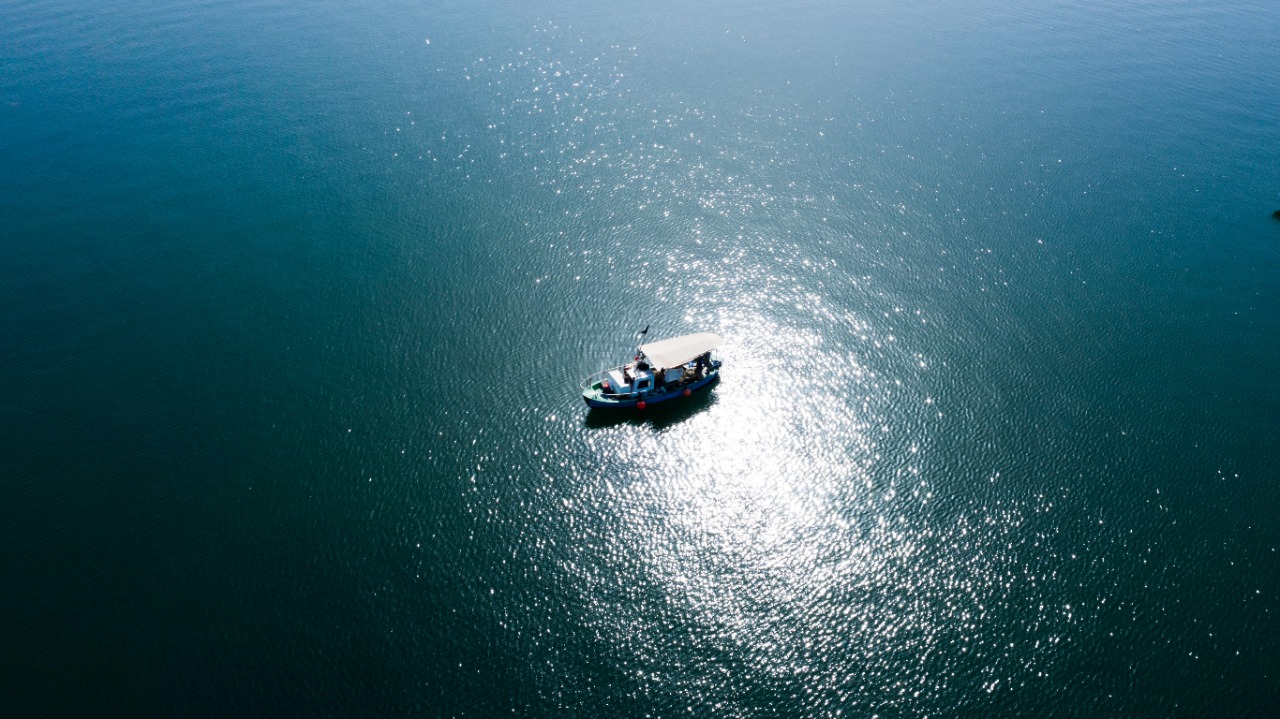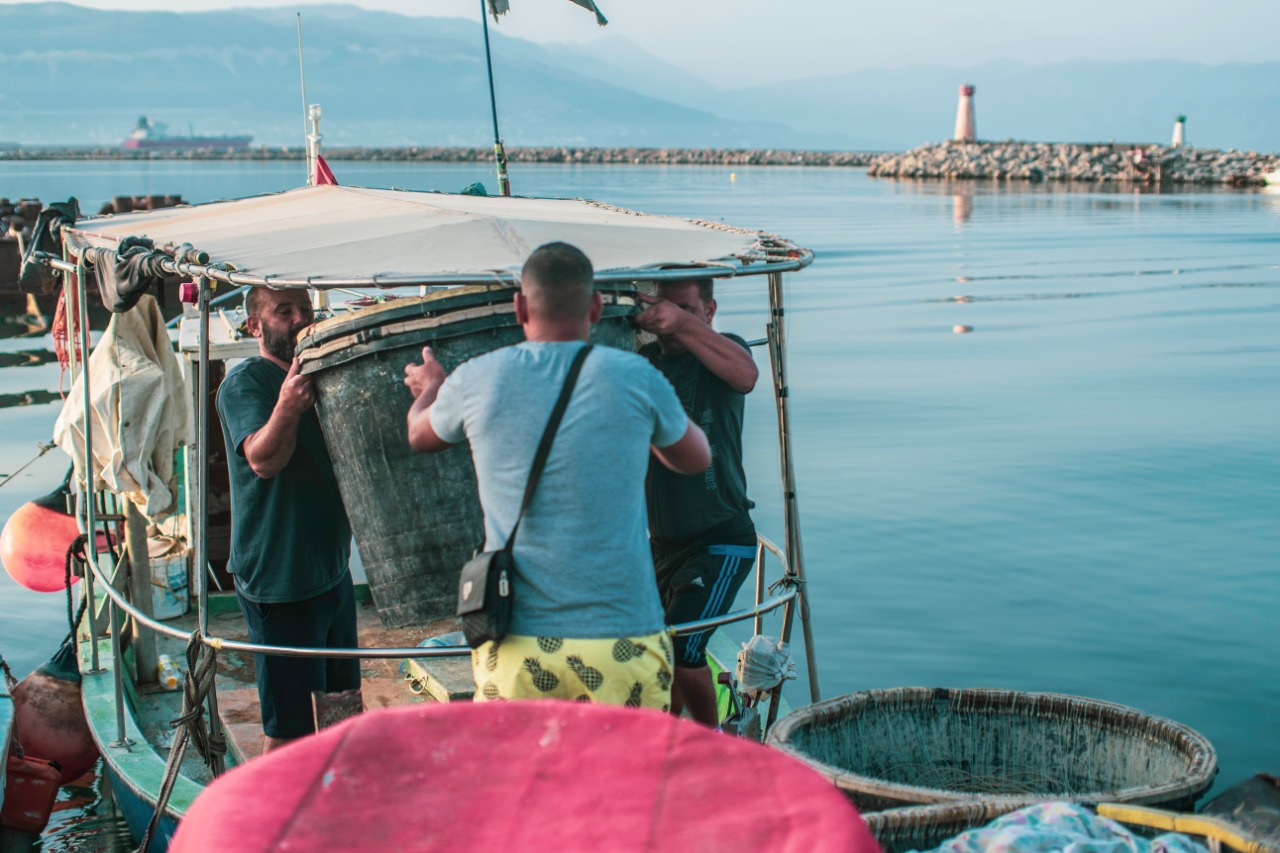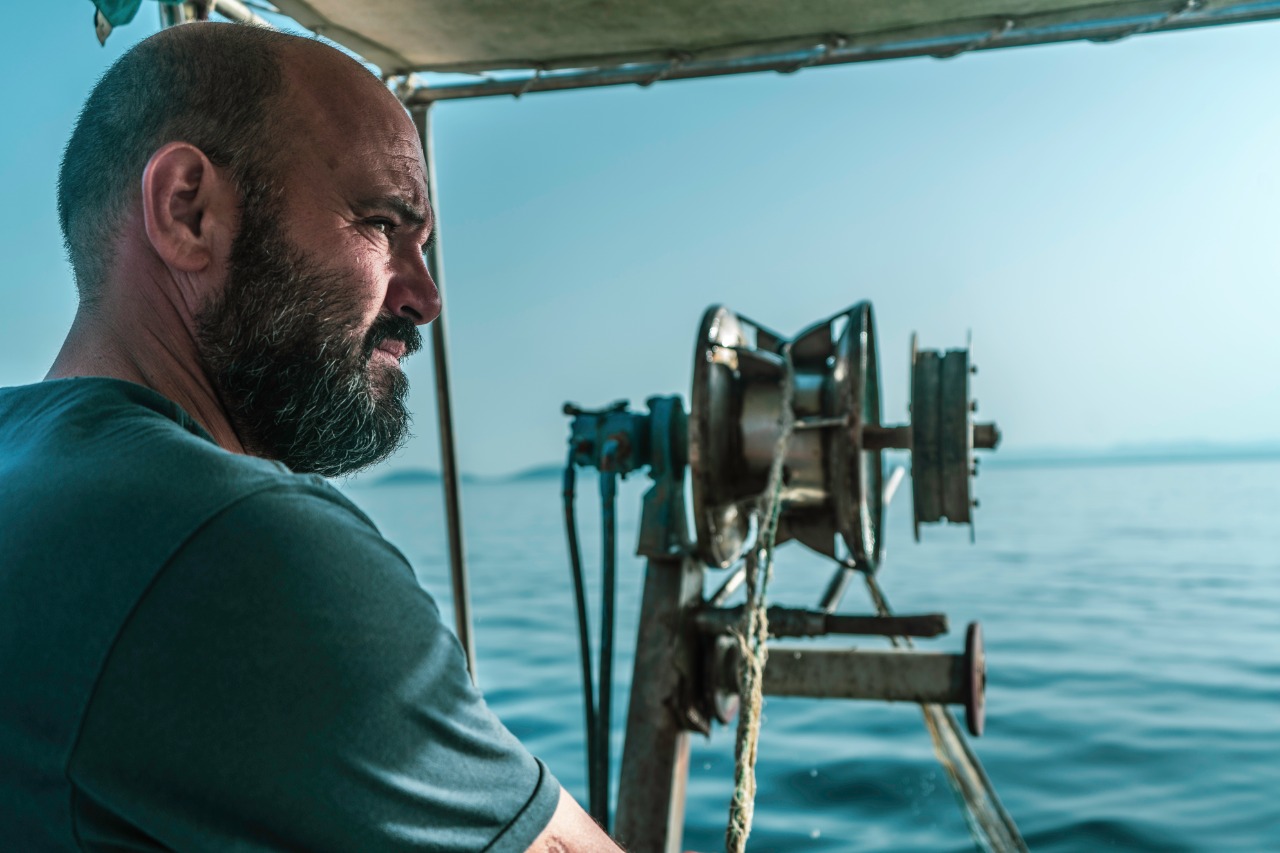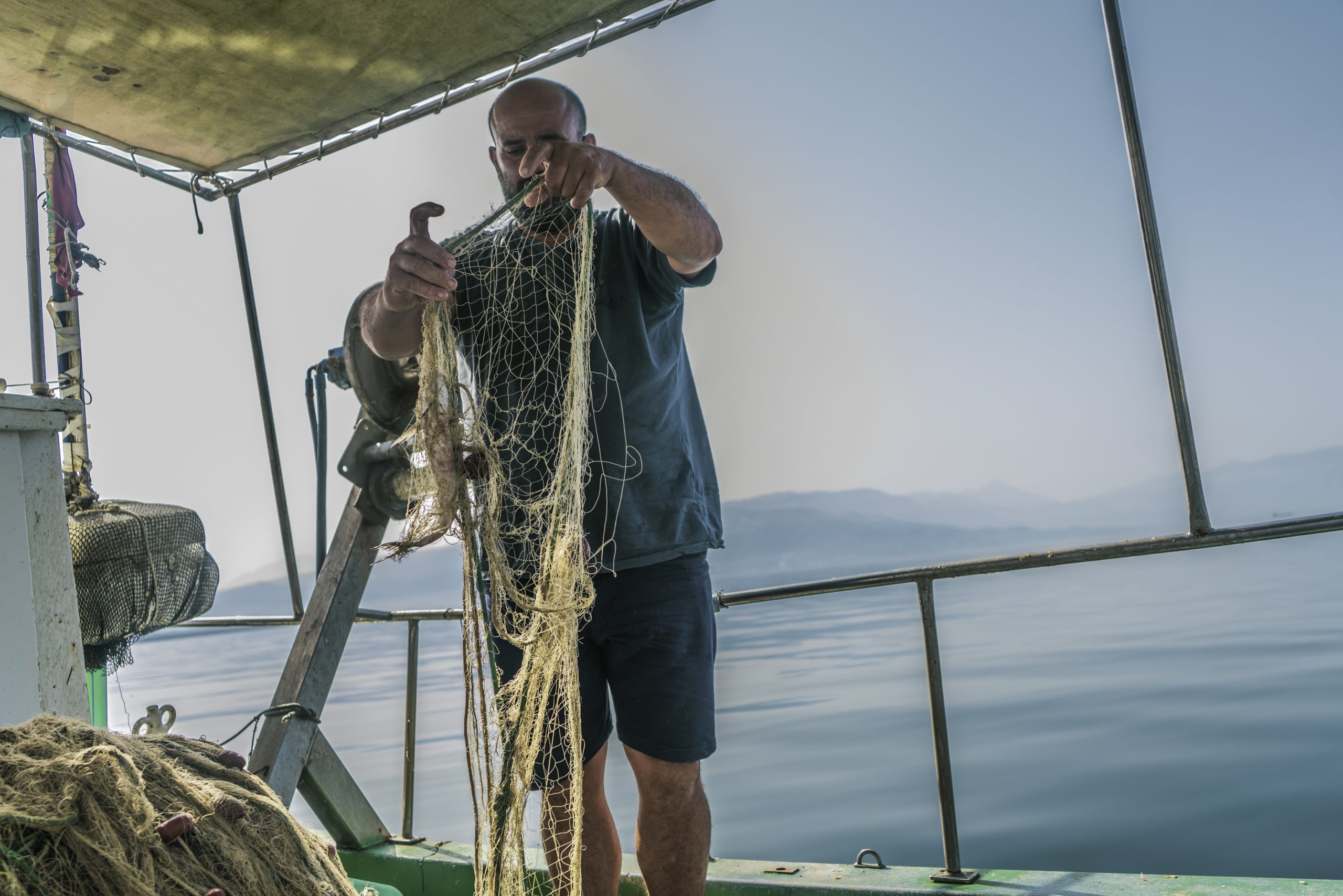
As fish are declining in alarming percentage in the Adriatic Sea, WWF Adria pledges to improve the situation.
It is early morning, it is not yet six o’clock, and Spiro together with his two friends, Izmir and Alil, are doing the usual rituals as they get ready to fish.
Spiro boarded quickly in his modest boat, not even five feet long, and begins to clean up any small dirt left on it. When he bought it a few years ago in Italy, the boat was used to train people to sail, but he transformed it, and made it suitable for catching fish.
He continues to carefully collect the trash and hastily arranges everything around so that there is room to sit, and finally throws a few buckets of water over the deck to make sure everything is clean and ready for departure.
Izmir and Alil, in the meanwhile, remove the baskets filled with hooks from the boat by placing them on the floor on the top of each other, not far from the place where they are anchored.
They will not take the hooks today, as they have thrown the nets.
We are located in the harbor of Triport, in Vlora. Even though it has all the parameters of a standard harbor, it looks neglected and presents a depressing view even that early in the morning.
On the other side of the road from the boat, very close to the sea, a large cemetery of automobile cars crashes the view, while on the side, there are some boats and ships. Some of them seem to be out of order and standing on the shore just to block the harbor space.
As Spiro prepares to leave, an old white car rushes toward, stopping in front of him.
It is Spiro’s friend, Agron, also a fisherman, but he will not fish today. With a big smile on his face he greets with all enthusiasm, and loudly, breaking the gloom that prevails in the harbor:
Agroni: Good morning! Buongiorno! Kalimera! Where are you up to?
Spiro: I’ll sail., I’m going to throw the nets.
Agroni: Okay (Pause for a few seconds) When will you be back? Will you be late?
Spiro: I don’t know. Why?
Agroni: I wanted some fish.
Spiro: But where is the fish?!

After a while we are all on the boat. “The sea is very tranquil today ” says Spiro with a smile. And he starts the boat engine and we head towards the nets.
For Spiro this is his first time to catch fish after a while. He had almost a month that has not gone fishing, because for two weeks in a row he had gone out to sea and had not caught any fish. Desperate, he had decided not to throw anymore the nets. But thanks to the insistence of his two friends, Izmir and Alil, he decided to go try again.
“When we were little,” says Spiro desperately, “at a depth of about 10-15 cm we caught fish with wire rods, from here to there.” (shows with his hand a distance of 2-3 meters) The wire was surrounded with rods and that’s how we caught fish. There were lots of fish. I am now 48 years old and I see a very big difference from when I was little. “There are very few fish now.”
According to the WWF 2020 Report, the statistics are staggering. The populations of mammals, birds, fish, amphibians and reptiles have had an alarming average decline of 68% since 1970. This is an alarming signal for everyone. Although general statistics show a significant decline in the amount of fish in the seas, there are no accurate statistics showing data on the amount of fish caught over the years, in the Adriatic Sea. In Albania, according to INSTAT, 52.09% of the total fishing is marine fishing.
The main reason for not having many fish in the sea in recent years according to fishermen, comes as a result of illegal fishing. “The situation is due to the use of dynamite,” says Spiro. “Also, boats scratching the sea below, is another problem.” adds he.
All the fishermen we asked about this problem told us that those who throw dynamite have good relations with the the state authorities, and the latter take advantage of them by getting free fish crates.
While according to Endri Hoxhaj, inspector of the fisheries in Vlora: “The reasons for the decrease in the amount of fish in the sea come as a result of climate change and fishing without criteria.” He said dynamite fishing can be done, but it is done in uninhabited and isolated areas, so it is difficult to inspect.
According to the latest WWF report the deterioration of life on marine comes as a result of overfishing, coastal development, pollution and climate change, which will continue to cause a growing spectrum of effects across marine ecosystems. “Our main goal – explains the manager of WWF Adria in Albania, Patrik Krstinic, is the conservation of nature, the conservation of the life in the sea. The Mediterranean, according to all scientific knowledge, is the most overfished sea in the world. So, the Adriatic is an integral part of the Mediterranean as well as the Albanian waters. We actually need to do something to stop this trend of depletion of the resources.” He declares.
The boat trip continues.
We have already approached the nets, and Spiro and his friends start collecting the nets and the fish caught in them.
“The nets are from 200 meters long.” -he says as he pulls his nets towards the boat. The nets are almost empty. Meters and meters of net pulled by Spiro are empty and occationally there is some fish, shrimp, or some crabs in the net.
“We have 1200 meters of nets here. We have thrown some nets here and some nets there.” -He directs his hand in two different directions. As he continues to collect the net.
“Here in Albania, fishing is a finished business,” says Spiro loudly continuing to work.

“Nobody helps you. Here I am for example, I am not subsidized by oil. I buy oil at the distributor. I am not subsidized because the boat must be over ten meters, according to the rules, I have to make a warehouse also. I buy oil for 1600 lek.”
“We try hard, working until dinner,” he continues, “It takes me at least a few hours to clean the nets.” Then we come back here around 4 o’clock, and another couple of hours to cast the nets, it becomes 6 o’clock. We return home around 7-8 o’clock in the evening. All day at work. And tomorrow morning, we will continue same thing all over again.”
Spiro like many artisan fishermen, does not meet the conditions to have a subsidy from the state. Most artisanal fishermen are like Spiro, they do not meet these conditions to be categorized in this type of fishing.
According to WWF Adria’s representative in Albania, Artenisa Peçulaj, most fishermen are not registered. “If 500 are declared registered in the state system, in fact they can be 800in number. On the other hand, they are not registered because of taxes, insurances, etc,” she emphasizes.
Failure to register has significant consequences for these fishers. Endri Hoxhaj, fisheries inspector in Vlora, says that unregistered fishermen, if caught, are obliged to pay very large amounts of fines, which with as many fish as they catch, they are not able to afford.
WWF Adria project in Albania
Spiro and many artisan fishermen of Triport and Ramidhë are involved in a project of the WWF Adria organization, which aims to increase the welfare of artisan fishermen in the bay of Vlora by stimulating tourism through fishing.
This initiative started in 2020 and is designed to improve small-scale fishing through a co-government model – as a method to move away from the unsuccessful centralization model.
“WWF Adria’s goal,” says project manager Patrick Krstinic. “Is to ensure that we have many more examples where fishermen are empowered and involved as legitimate actors in decision-making processes and equipped with opportunities to create solutions that result in sustainable stocks and improve incomes.”
Spiro finds it difficult at every step of the day to practice his profession, that’s why he is asking for help. “Do you know what we want?” We want a type of co-op where we can go and buy materials at a lower price or half price. A price that we can rejoice as well. We need a lot of materials and we do not have the possibility to buy them. We keep a pair of nets for two years, because we cannot replace them.” he emphasizes.
“For example, -he continues “If you go to Monopoly, Italy, you will find the materials cheap. I find them a little used of course, but they are cheap and so I can work. Now for instance, the boat works very slow, and consequently consumes more oil because it needs to be repaired, but I can not repair it because it is too expensive. It takes about 1 million lek or more, and I can not repair it. If I repaire it, I would have to do it as soon as possible, in August or September, but I can’t do it.”
WWF Adria is implementing operations within the Small-Scale Fisheries Transformation Project in three areas in Croatia: Telascica, Lastovo and the Velebit Canal.
Working in Albania, WWF Adria ensures that another fleet of fishermen in the Adria region is empowered and helps strengthen the small-scale fishermen to ensure that co-management becomes the norm and no exception in the Mediterranean.
According to Artenisa Peçulaj, WWF Adria is working to ensure: a) fishermen are recognized as legitimate actors in a pilot site in Albania in co-government systems; b) improve the capacity of national and local actors involved in fisheries to implement sustainable fisheries management strategies; and c) to improve the income and livelihood opportunities of small-scale fishermen.
Lots of work, but little fish.
Spiro with his friends have already pulled all the nets in the boat and now they are looking at what they have been able to catch.
“Look here. I may have caught about 7-8 kilograms of fish,” he says. This is mullet fish. It is a cheap fish. If I sell it myself, I’ll sell it for 5 thousand lek per kilogram, but I wont’s sell it myself, as I will take it to the warehouse and they will buy it for 4 thousand lek per kilogram.”
“Today I earn about 28-32 thousand lek.” he continues to explain. “I need 20,000 lekë for oil per day, and you can calculate for yourself how much I have left. I have to earn at least 100 thousand lekë per day to cover my expenses.” Spiro ends.
“The curse of the fish,” explain the fishermen. “Happy is he who eats fish, but cursed is he who brings it out of the sea.”
Lungomare Vlora, July 29, 2021
After leaving Spiro and his friends to take the fish to the warehouse and get ready to throw the nets back into the sea, we left the port and headed towards the city of Vlora, where preparations were being made for the next activity.
WWF Adria representatives in Albania organized the same evening in Lungomare of Vlora a pleasant and spontaneous activity that was open to all citizens of Vlora, many passers-by and guests of the evening.
All together they watched a short documentary on the story of two fishermen from Radhina and Zvërnec.
Throughout the four to five minutes of this film that was constantly repeated during the evening, they were able to discover and learn more about the challenges of these fishermen’s daily lives throughout the year.
From the big screen also, the guests could see a series of artistic photos of artisanal fishermen, some of whom were guests and were part of this evening. With glasses of drink in their hands they were looking with emotion the parts of their daily lives and work.
“There is a side when fishermen speak, and there is a side of institutions and the way of mediation between these two gates is one of our most important objectives. ”- Says in her opening speech the representative of WWF Adria in Albania, Artenisa Peçulaj.
“We all need to realize that our sea is empty and basically, it’s going to be empty if we are not going to do something. -says Patrik Krstinic in his speech this evening. “And maybe it sounds difficult to reach the goal that the fishers are satisfied with their lives with their incomes and at the same time to have a full sea, it’s doable, its reachable. There are many activities we can do to reach this goal.” Mr. Krstinic proposed. “One of the activities is pescaturismo. It one of the activities that provides fishers with the income actually it can increase their income while at the same time preserving the life in the sea.”
As another successful solution Mr. Krstinic also mentions the Jabuka Pomo Pit Fishing Area in Croatia. This is a 3000 square km protected area in the Adriatic Sea, which is helping marine life to recover, for the benefit of the marine environment and local fishing communities.
This area is an example of best practice in transnational cooperation and in incorporating the views and opinions of fishermen and other stakeholders when creating spatial protection measures. This area is being developed in cooperation with two countries, Italy and Croatia.
“I’m talking with these fishers in the Jabuka/Pomo Pit area,” adds Mr. Krstinic “and they say that they have never fished more in their lives as they are doing now, and some of them are really old. I believe that it can happened also here in Albania, but we need to act as soon as possible while is still time.” Ends his speach, the project manager, Patrik Krstinic.

In Shkodra, July 30, 2021
WWF Adria representatives also organized a meeting with the President of the Management and Fisheries Organization in Shkodra, Arjan Cinari.
During the meeting, the history of setting up OMP was discussed as well as the challenges of starting the projection in the future. The objectives of the meeting were similar to the objective of the Craft Fishing project for the establishment of a cooperation community.
Mr. Cinari expressed his readiness to support the process of revitalization of OMP Vlora and the establishment of cooperation committees.
Aurora Velaj is a freelance journalist and book author. She has worked in print, audiovisual and electronic media. Aurora started her career when she was a journalism student, with her first collaborations with the newspaper “Zeri i Rinise”, “Koha Jonë”, “Bota-Sot” 1996-1999 in Tirana. Immediately after the war in 2000-2001, she moved to Kosovo where she collaborated with the Kosovo National Radio “Blue Sky Radio” and “Bota Sot” in Pristina. Then she worked as a journalist in Vancouver, Canada, in “Co-op Radio.” Since 2014 she has moved to Albania where she has collaborated with media such as Gazeta Shqiptare, Telegraf, “News That Moves”, etc.p

